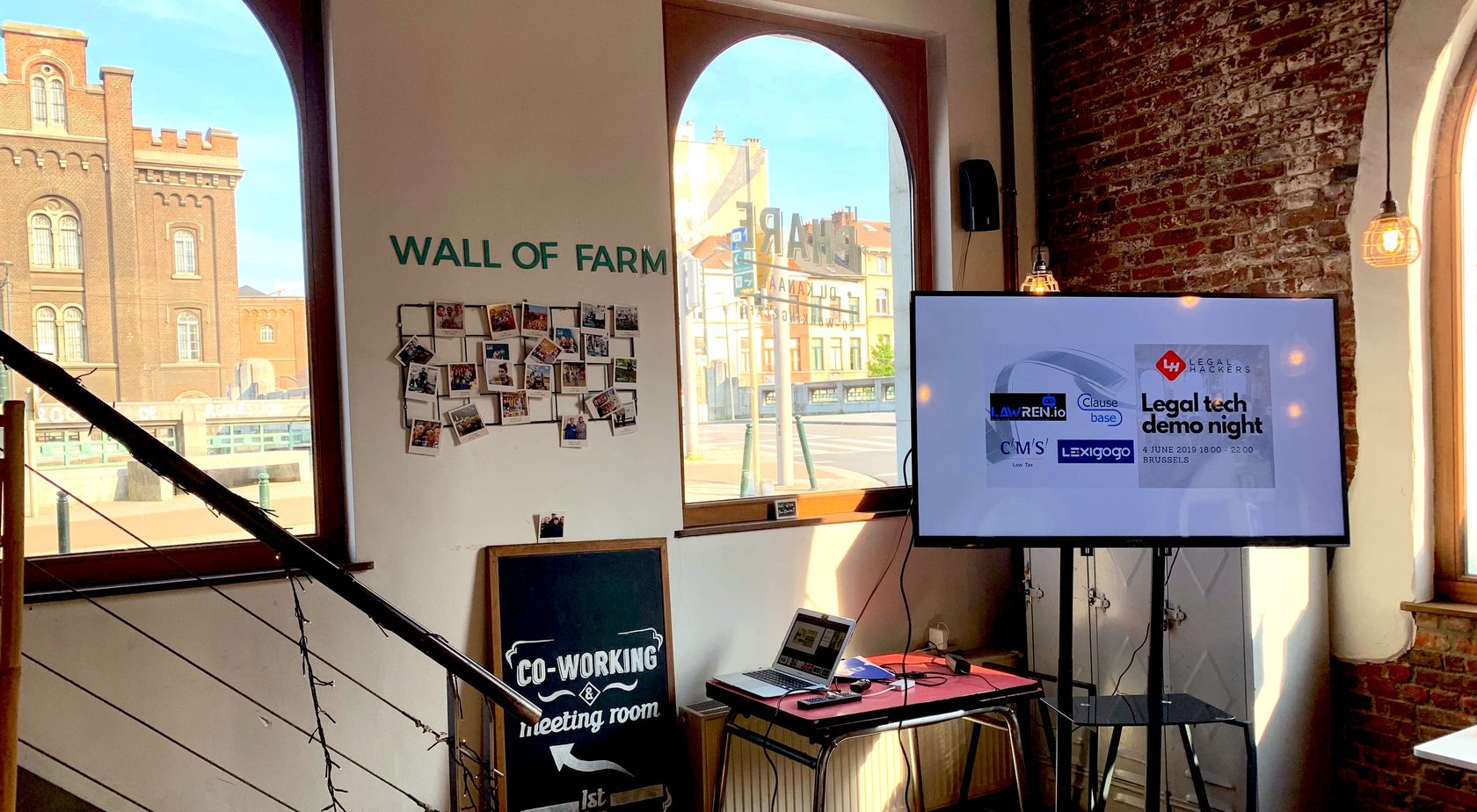The Belgian chapter of the global grassroots community has already hosted over 30 meetups since it was established a few years ago. A big thumbs up to Caroline, Tommy and the rest of the team for their relentless drive and ongoing efforts!
The format allows you to explore legal tech solutions in depth. How do you use them? Who decides to build one and why? Live demos and insights into the entrepreneurial journey behind the legal tech tools is what these night are all about. Thanks to the informal setting – a cosy co-working café – the audience is encouraged to actively participate.

For those interested in better understanding the value proposition set out by the pitching legal techs, I wrote a little summary on the night.
Lawren.io
Dries Wijnen – founder of Lawren.io, a conversational legal assistant – kicked off the night by telling everyone about his journey, which started roughly a year ago. With his start-up, Dries wants to improve efficiency in the legal industry and give lawyers back their core business by saving them both time and money.
The main pain points the team wants to tackle are inefficiencies in contract drafting due to a lack of digitization and knowledge sharing within law firms, and the lack of proper client intake through a firm’s website. While the former is well documented and known, the latter provides an interesting angle. Customers basically want to know three things when they visit your website: can you help me, when can it be done and what will it cost me? However, lots of firms still don’t have a strategy for capturing digital leads.
After the introduction, Dries dived into a few use cases his platform has already tackled. The one that received most exposure and press coverage is their pro bono lawyer intake chatbot built for the Flemish and local Bar Associations. Next up was the client intake application built for a U.K. legal powerhouse with over 2000 attorneys. And to top it all of we were teased with the document generation module Lawren.io released earlier this year, in addition to the machine learning engine providing actionable legal insights to client requests.
Lexigogo
The second person to entertain the crowd was Laurens Theunis, CEO and founding partner of Lexigogo, probably one of the most interesting legal techs in the world. Made in Belgium!
Lexigogo is tapping into the growing importance of voice and video technology by providing the world’s first smartphone app to create legally binding video contracts (patent pending). Over 1.5 billion people globally can’t read or write, while video allows us to add so much more context and detail to agreements. How come no one ever thought of this before?
Laurens explained their smartphone app is only a first real life application of the technology as there is a plethora of use cases for both businesses and consumers. And the best thing about it is that it’s being developed so it’s a legally binding, electronically signed document in all major jurisdictions.
After testing their MVP with a carefully selected group of 200 users over the course of 2018, Lexigogo is now preparing the launch of their updated application in the United States, focussing on millennials. I can’t wait!
Laurens also made an interesting analogy with online banking in order to show the novelty of their product. While millennials are immediately hooked, older generations tend to need some guidance and education on the use and benefits of video contracts.
Clausebase
Next up was Senne Mennes, co-founder of Clausebase. His company provides a contract drafting automation tool, specifically aimed at lawyers. In fact, Clausebase boasts that they are a product by lawyers for lawyers.
As opposed to most document automation tools in the market, Clausebase – as the name suggests – is based upon a stack of contract clauses, versus the commonly used questionnaire-like automation approach.
The platform is set-up to be both multi-lingual and multi-jurisdictional, which again shows it was created with lawyers in mind. In addition, it provides a number of other nifty features such as clause logic, gender adaptability of words and sentences,
To further boost their bottom-up approach for contract automation, the team wants to add a semi-automatic clause important module and build a legal clause library. While the former should shorten set-up times, the latter is part of bigger digitization wave moving away from traditional paper books.
CMS – Dawn Raid Assistant
The final speaker of the night was Roderick Nieuwmeyer, a competition lawyer at the CMS office in Brussels. He enlightened us with one of CMS’ latest innovations, the Dawn Raid Assistant.
Roderick shared his story of trying to innovate from within a bid law firm. From coming up with the idea and pitching it to the board in 2015, up until launching in 2019. Seems like forever for startups!
The Dawn Raid app, is set up multi-lingual and provides access to CMS lawyers in 27 countries. Apart from the core feature – a panic button in case your company gets raided by competition authorities – the app provides checklists and guidelines for counsels being raided.
Anyone can download and use the app for free, although some features require you to sign-up (but they’re free too!). CMS even provides a white label version of the app to their corporate clients, to allow them to distribute it among the entire company. A simple interface and no data gathering are the clear USP’s.
